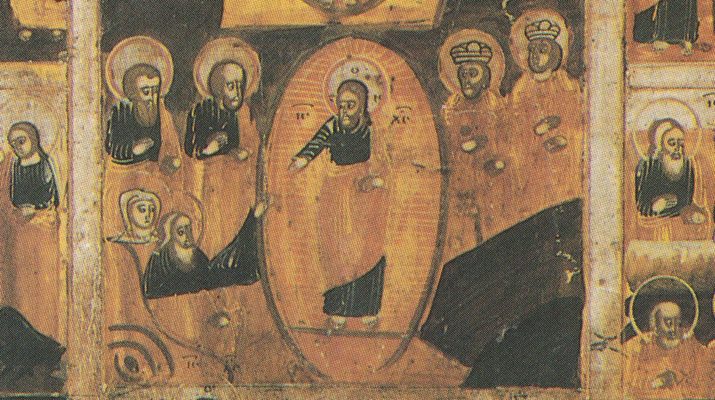Matthew 9:10-13
Narrative Lectionary 143
10 AndA as he sat at dinnerB in the house,C, D
A {untranslated} = ginomai. This is to come into being, to happen, become, be born. It can be to emerge from one state or condition to another or is coming into being with the sense of movement or growth.
B “sat at dinner” = anakeimai. 14x in NT. From ana (up, again, back, among, between, anew) + keimai (to lie, recline, be set, appointed, destined; to lie down literally or figuratively). This is to recline, particularly as one does for dinner. It can also be reclining as a corpse.
C “house” = oikia. From oikos (house – the building, the household, the family, descendants; the temple). This is a house, household, goods, property, family, or means.
D {untranslated} = idou. From eido (to be aware, see, know, remember, appreciate). This is see! Lo! Behold! Look! Used to express surprise and or draw attention to the statement.
manyE tax collectorsF and sinnersG cameH
E “many” = polus. This is much, often, plenteous – a large number or a great extent.
F “tax collectors” = telones. From telos (an end, aim, purpose, completion, end goal, consummation, tax; going through the steps to complete a stage or phase and then moving on to the next one) + oneomai (to buy); {from onos (a price or sum)}. This is tax collector, one who worked for the Romans taking taxes from Jews. It also meant the toll house. Literally, this is “paying at the end.”
G “sinners” = hamartolos. From hamartano (to miss the mark, do wrong, make a mistake, sin); {from a (not) + meros (a part or share)}. This is sinning, sinful, sinner. It referred to missing the mark or falling short. The term was also used in archery for missing the target.
H “came” = erchomai. This is to come or go.
and were sitting withI JesusJ and his disciples.K
I “sitting with” = sunanakeimai. Related to “sat at dinner” in v10. 7x in NT. From sun (with, together with) + anakeimai (see note B above). This is to dine, recline at a table with someone else, a dinner guest, the table itself.
J “Jesus” = Iesous. From Hebrew Yehoshua (Joshua, the Lord is salvation); {from YHVH (proper name of the God of Israel; the self-existent and eternal one); {from havah (to become) or from hayah (to come to pass, become, be)} + yasha (to deliver, defend, help, preserve, rescue; properly, to be open, wide or free, which implies being safe. So, in a causative sense, this is to free someone)}. This is Jesus or Joshua in Greek – the Lord saves or the Lord is salvation.
K “disciples” = mathetes. From matheteuo (to make a disciple of); from manthano (to learn key facts, gain knowledge from experience; generally implies reflection as part of the learning process); from math– (thinking things through). This is a disciple, learner, or student. It is where we get “mathematics” from.
11 When the PhariseesL sawM this, they said to his disciples, “Why does your teacherN eatO with tax collectors and sinners?”
L “Pharisees” = pharisaios. From Aramaic peras (to divide, separate) and from Hebrew parash (to make distinct, separate, scatter). This is a Pharisee, a member of a Jewish sect active in the 1st century. Their name meant separate in the sense of wanting to live a life separated from sin. Whereas the Sadducees were part of the priestly line and inherited their religious position and responsibilities, Pharisees were regular people who studied the scriptures and offered guidance to regular folk. Sadducees were often wealthier and willing to sacrifice their identity to rub elbows with Roman society. Pharisees were often more concerned with what it meant to follow God without compromising what made them different as followers of God. Sadducees primarily believed in that which was written down (the first five books of the Bible) and Pharisees believed in the Bible and the traditions of the elders. Pharisees had a very wide range of interpretations and diversity of opinion. Their standard mode of religious engagement was lively debate with one another. To argue religion with another teacher was to recognize that they had something of value to offer.
M “saw” = horao. To see, perceive, attend to, look upon, experience. Properly, to stare at and so implying clear discernment. This, by extension, would indicate attending to what was seen and learned. This is to see, often with a metaphorical sense. Can include inward spiritual seeing.
N “teacher” = didaskalos. From didasko (to teach, direct, instruct, or impart knowledge; in the New Testament, almost always used for teaching scripture); from dao (to learn). This is teacher or master.
O “eat” = esthio. This is to eat or figuratively to devour or consume like rust.
12 But when he heardP this, he said, “Those who are wellQ haveR
P “heard” = akouo. This is hear or listen, but it also means to understand by hearing. This is where the word “acoustics” comes from.
Q “are well” = ischuo. Related to “have” in v12. From ischus (strength, might, power, force, ability; power that engages immediate resistance); {perhaps from is (force) + echo (to have, hold, possess)}. This is to be strong or have power. It can also refer to being healthy and vigorous. Further, it can mean to prevail. It is strength in action against resistance, exercising force in a literal or figurative sense.
R “have” = echo. Related to “are well” in v12. See note Q above.
no needS of a physician,T but those who are sick.U
S “need” = chreia. From chraomai (to use, make use of, give what is needed, act in a specific way, request); related to chre (what is proper, fitting, or necessary). This is the is task, business, or affair. It can also be need, want, or destitution.
T “physician” = iatros. 7x in NT. From iaomai (to heal, particularly from a physical illness, or a spiritual difficulty; to cure or make whole in a literal or figurative sense). This is healer i.e. physician.
U “sick” = kakos. 16x in NT. From kakos (bad, evil, harm, ill; evil that is part of someone’s core character – intrinsic, rotted, worthless, depraved, causing harm; deep inner malice that comes from a rotten character; can be contrasted with the Greek poneros, which is that which bears pain – a focus on the miseries and pains that come with evil; also contrasting the Greek sapros, which deals with falling away from a previously embodied virtue). This is wrongly, badly, cruelly, with bad motives, misery connected to affliction. It can be physically badly or morally badly, i.e. evilly.
13 GoV and learnW what this means,X
V “go” = poreuomai. From poros (ford, passageway). This is to go, travel, journey, or die. It refers to transporting things from one place to another and focuses on the personal significance of the destination.
W “learn” = manthano. Related to “disciples” in v10. See note K above.
X “means” = eimi. This is to be, exist.
‘I desireY mercy,Z not sacrifice.’AA For I have not come to callBB the righteousCC but sinners.”
Y “desire” = thelo. This is to wish, desire, will, or intend. It is to choose or prefer in a literal or figurative sense. It can also mean inclined toward or take delight in. It can have a sense of being ready to act on the impulse in question.
Z “mercy” = eleos. This is mercy, pity, tender mercy, or compassion, whether from humans or from God. This is mercy, generally understood in action by word or deed. When we sing or say “kyrie eleison” (Lord, have mercy), it is related to this word.
AA “sacrifice” = thusia. From thuo (to breathe violently, seethe, rage; properly, to rush as breathing heavy; so smoke as in offering an animal sacrifice by fire; by extension, killing or slaying in general). This is a sacrifice or offering. It can refer to the act of sacrifice or the thig being sacrificed. Also, this is sacrifice in a literal or figurative sense.
BB “call” = kaleo. Related to keleuo (to command, order, direct); from kelomai (to urge on). This is to call by name, invite, to name, bid, summon, call aloud.
CC “righteous” = dikaios. From dike (the principle of justice; that which is right in a way that is very clear; a decision or the execution of that decision; originally, this word was for custom or usage; evolved to include the process of law, judicial hearing, execution of sentence, penalty, and even vengeance; more commonly, it refers to what is right); may be from deiknumi (to show, point out, exhibit; figurative for teach, demonstrate, make known). This is correct, righteous, just, or a righteous person. It implies innocent or conforming to God’s standard of justice.
Image credit: “The Great Feasts of the Church Year” – an 18th century Karelian icon.




